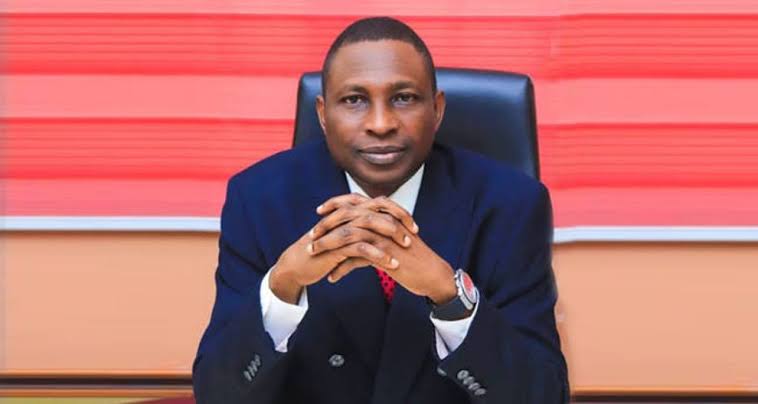Africa
The EFCC And The Endless Battle Against Corruption: Time For A New Approach -By Maryam Mustapha Bukar
EFCC must evolve from being a reactive agency into a preventive one. Arresting people after they have looted funds is important, but preventing looting in the first place is even more critical. This means working closely with other institutions to strengthen transparency mechanisms, promote digital governance, and reduce the opportunities for corruption to occur.

Corruption is Nigeria’s greatest enemy, draining resources, crippling institutions, and stunting development. Every government, from independence to date, has acknowledged it as a national crisis. Yet, despite decades of anti-corruption rhetoric, the menace continues to thrive. At the center of Nigeria’s anti-graft efforts stands the Economic and Financial Crimes Commission (EFCC), established in 2003. For over two decades, EFCC has fought corruption, investigated financial crimes, and prosecuted offenders. But the critical question is: has EFCC succeeded in altering the culture of corruption in Nigeria, or has it become another institution trapped in the system it was meant to sanitize?
In fairness, EFCC has had its moments of glory. It has secured convictions against high-profile politicians, businessmen, and internet fraudsters. Some of its bold prosecutions have sent shockwaves through Nigeria’s political class, proving that even the powerful can be held accountable. It has also recovered billions of naira and assets looted from public coffers, which in theory should have been channeled back to national development. These efforts, at least on the surface, give the impression of a commission committed to sanitizing public life.
Yet, beneath these achievements lies a troubling reality. Nigeria still ranks poorly on global corruption perception indices. In fact, Transparency International’s corruption rankings have consistently placed Nigeria among the worst performers worldwide. This contradiction raises a fundamental question: if EFCC has been working tirelessly, why does corruption continue to flourish almost unchecked? The uncomfortable answer is that EFCC is fighting a war it cannot win with its current approach.
One of the agency’s biggest flaws is selective prosecution. Many Nigerians believe EFCC targets politicians out of power while shielding those aligned with the ruling elite. This perception has damaged its credibility and reinforced the idea that the commission is a political tool rather than an impartial enforcer of the law. When justice is applied selectively, it ceases to inspire confidence. Instead, it becomes another weapon in the arsenal of political witch-hunting.
Another concern is the overemphasis on low-level offenders. While it is commendable that EFCC cracks down on cybercrime and internet fraudsters—popularly known as “Yahoo Boys”—these arrests often make the headlines while the “big fish” swim freely. Many Nigerians have asked: why is it easier to parade young fraudsters in public while cases involving billions of naira looted by politicians drag endlessly in court, sometimes for over a decade? This double standard makes the agency appear more interested in scoring easy victories than dismantling the real networks of corruption.
The judiciary also compounds EFCC’s challenges. Nigeria’s legal system is notoriously slow, plagued with adjournments, loopholes, and technicalities. High-profile corruption cases are frequently stalled, sometimes until they fizzle out. The result is a vicious cycle where prosecutions drag on, convictions are rare, and the corrupt escape justice. Without judicial reforms to fast-track corruption trials, EFCC will remain a toothless bulldog—barking loudly but biting sparingly.
But perhaps the most fundamental problem is that EFCC operates in an environment where corruption is not just an act but a culture. Corruption in Nigeria is systemic; it is woven into everyday life, from the highest corridors of power to the smallest public offices. Fighting corruption in such an environment requires more than arrests and prosecutions; it requires a wholesale transformation of values, institutions, and governance. Sadly, EFCC is neither designed nor empowered to drive such cultural change.
So, what should be done? First, EFCC must be granted true independence. It should not operate under the shadow of the executive arm of government. Its leadership should be insulated from political influence, with appointments made through a transparent, merit-based process rather than presidential discretion. Only then can Nigerians trust that its actions are impartial.
Second, EFCC must prioritize systemic corruption over petty crimes. The billions stolen from Nigeria’s treasury dwarf the sums associated with internet fraud. By focusing energy on dismantling the networks of political corruption, EFCC can send a stronger message and address the root of the problem. This will require courage, resources, and political will—but without it, the commission will remain a fire brigade putting out small flames while the inferno rages on.
Third, public accountability must be enhanced. Nigerians need to see not just that funds are recovered, but also how those funds are used. Transparency in asset recovery and utilization will restore confidence in the commission’s work. Citizens are tired of hearing that trillions have been recovered without tangible improvements in healthcare, education, or infrastructure.
Finally, EFCC must evolve from being a reactive agency into a preventive one. Arresting people after they have looted funds is important, but preventing looting in the first place is even more critical. This means working closely with other institutions to strengthen transparency mechanisms, promote digital governance, and reduce the opportunities for corruption to occur.
In conclusion, the EFCC stands at a crossroads. It can continue on its current path—occasionally arresting individuals, making headlines, and yet achieving little systemic change—or it can reinvent itself into a truly independent, courageous, and reform-driven institution. Nigerians do not need more press conferences announcing arrests; they need a commission that dismantles the culture of impunity that allows corruption to thrive. The battle against corruption is too important to be waged half-heartedly. The EFCC must either rise to the challenge or risk becoming just another symbol of Nigeria’s failed war on corruption.
Maryam Mustapha Bukar is a 300 level student from Mass Communication Department Kashim Ibrahim University (Formerly Borno State University)





















